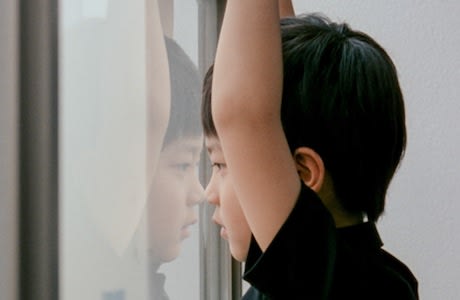In the hands of an adept filmmaker, a familiar story can address facets of the human condition in a way that uncovers fresh insights. Lauded Japanese director Hirokazu Kore-Eda (After Life, Air Doll) frames his distinct angle on the question of nature versus nurture with elegance, wit and compassion.
Being an astute product of its culture, Like Father, Like Son considers the historically deep-rooted preoccupation with the pride and honour of bloodlines held by the kind of workaholic traditionalists that neglect their families to achieve higher status in the workforce.
Ryota Nonomiya (Masaharu Fukuyama) is a man tied to these increasingly antiquated ideals. Holding discipline and competitiveness in the highest regard, he's perplexed and disappointed by his six-year-old son's disinterest in winning, as revealed during an interview with a perspective "cram school" that opens the film. An excuse for this dissimilarity in the temperament between father and son presents itself when Ryota and his loving, but frustrated wife, Midori, learn that young Keita was switched with another child at birth.
The hospital responsible arranges a meeting between the Nonomiya family and the Saikis, a humble working class clan that's been raising the Nonomiyas' biological son, Ryusei. Staring with a series of meetings before graduating to sleepovers, the two families have until the start of the school year to decide whether or not they wish to permanently exchange children.
Emphasising the class divide between the two families, Like Father, Like Son finds its potency in the contrast of parenting styles. Cold and arrogant in his success, Ryota feels that the only true measure of a proper upbringing is financial prosperity and the facilitation of ambition. Conversely, the relaxed (some would say lazy) and boisterous Yudai Saiki enjoys the lack of responsibility he's afforded as a simple shopkeeper, which allows him to spend time playing with his three children.
A master at capturing the quiet impact of the little moments of human interaction that expose attitudes and shape perspectives, Kore-Eda refrains from making overt value judgements or reaching for grand dramatic gestures, letting the audience draw its own conclusions based on the actions of two families that follow very (superficially) different schools of thought.
Skilfully coaxing charming, emotionally nuanced performances out of his leads, including the two young boys caught in the confusion of adults trying to reconcile the obligations of duty and love, the director, who also wrote the script, presents these naturalistic interactions with a calm, studied eye. The shot selections of cinematographer Mikiya Takimoto perfectly complement this humble aesthetic, tending towards simple, elegant compositions that put the emphasis on the performers.
Symbolic usage of imagery like a rock standing against the flow of a river and lengthy scenes of Ryota driving — life is passing by without meaning for a man resistant to change — aren't as profound as intended, but that's a minor quibble about a thoughtful film that prudently and empathetically addresses universal concerns from within a culturally specific context.
(Mongrel Media)Being an astute product of its culture, Like Father, Like Son considers the historically deep-rooted preoccupation with the pride and honour of bloodlines held by the kind of workaholic traditionalists that neglect their families to achieve higher status in the workforce.
Ryota Nonomiya (Masaharu Fukuyama) is a man tied to these increasingly antiquated ideals. Holding discipline and competitiveness in the highest regard, he's perplexed and disappointed by his six-year-old son's disinterest in winning, as revealed during an interview with a perspective "cram school" that opens the film. An excuse for this dissimilarity in the temperament between father and son presents itself when Ryota and his loving, but frustrated wife, Midori, learn that young Keita was switched with another child at birth.
The hospital responsible arranges a meeting between the Nonomiya family and the Saikis, a humble working class clan that's been raising the Nonomiyas' biological son, Ryusei. Staring with a series of meetings before graduating to sleepovers, the two families have until the start of the school year to decide whether or not they wish to permanently exchange children.
Emphasising the class divide between the two families, Like Father, Like Son finds its potency in the contrast of parenting styles. Cold and arrogant in his success, Ryota feels that the only true measure of a proper upbringing is financial prosperity and the facilitation of ambition. Conversely, the relaxed (some would say lazy) and boisterous Yudai Saiki enjoys the lack of responsibility he's afforded as a simple shopkeeper, which allows him to spend time playing with his three children.
A master at capturing the quiet impact of the little moments of human interaction that expose attitudes and shape perspectives, Kore-Eda refrains from making overt value judgements or reaching for grand dramatic gestures, letting the audience draw its own conclusions based on the actions of two families that follow very (superficially) different schools of thought.
Skilfully coaxing charming, emotionally nuanced performances out of his leads, including the two young boys caught in the confusion of adults trying to reconcile the obligations of duty and love, the director, who also wrote the script, presents these naturalistic interactions with a calm, studied eye. The shot selections of cinematographer Mikiya Takimoto perfectly complement this humble aesthetic, tending towards simple, elegant compositions that put the emphasis on the performers.
Symbolic usage of imagery like a rock standing against the flow of a river and lengthy scenes of Ryota driving — life is passing by without meaning for a man resistant to change — aren't as profound as intended, but that's a minor quibble about a thoughtful film that prudently and empathetically addresses universal concerns from within a culturally specific context.
